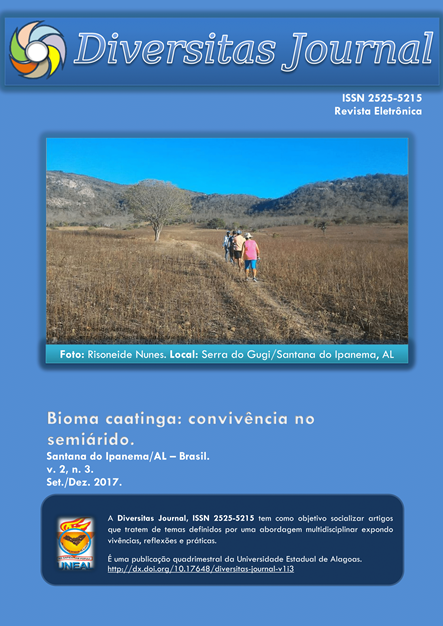A colonialidade cosmogônica a partir da autopoiese e da colaboração intercultural para a produção do conhecimento permeados pelo paradigma emergente
DOI:
https://doi.org/10.17648/diversitas-journal-v2i3.578Abstract
RESUMO: O presente artigo versa sobre a produção do conhecimento a partir das experiências interculturais, as quais corroboram com a fundamentação da colonialidade cosmogônica, a autopoiese e a colaboração intercultural permeado pelo paradigma emergente. Nesse sentido, esse estudo busca apresentar a simbiose que há entre estes conceitos cunhados por Walsh (2009); Araújo (2014); Daniel Mato (2002) e Santos (2006). Possibilita a conscientização ao que concerne para a decolonialidade da produção do conhecimento. Metodologicamente a pesquisa partiu da revisão de literatura acerca dos conceitos supracitados. Entender essa premissa é de fundamental importância para uma postura ética, política, social, cultural e econômica, premissas que viabilizam a transformação e emancipação social, uma vez que os bens socialmente produzidos não são usufruídos por todos, há hierarquias e uns são mais beneficiados do que outros, especialmente na escrita cientifica. Daí, a produção do conhecimento se dá pela mesma ótica, a colonialidade eurocêntrica predomina nas produções científicas em detrimento dos diversos saberes que os povos das diversas culturas produzem na sua cotidianeidade, portanto, aqui se apresenta a importância do paradigma emergente que viabiliza a valorização dos saberes diversos.
PALAVRAS-CHAVE: Educação, Saberes, Pedagogias/práxis.
ABSTRACT: This article deals with the production of knowledge from intercultural experiences, which corroborate with the foundation of cosmogonic coloniality, autopoiesis and intercultural collaboration permeated by the emerging paradigm. In this sense, this study seeks to present the symbiosis between these concepts coined by Walsh (2009); Araújo (2014); Daniel Mato (2002) and Santos (2006). It makes possible awareness of the decoloniality of the production of knowledge. Methodologically, the research was based on a review of the literature on the above concepts. Understanding this premise is of fundamental importance for an ethical, political, social, cultural and economic stance, premises that enable transformation and social emancipation, since socially produced goods are not enjoyed by all, there are hierarchies and some are more benefited by the than others, especially in scientific writing. Hence, the production of knowledge comes from the same perspective, the Eurocentric coloniality predominates in the scientific productions to the detriment of the diverse knowledge that the people of the diverse cultures produce in their daily life, therefore, here is presented the importance of the emergent paradigm that allows the valorization of the knowledge.
KEYWORDS: Education, Knowledge, Pedagogies/praxis.
Metrics
References
ARAÚJO, Lindemberg Medeiros. Teoria do conhecimento em Maturana e Varela – Movimento Realidade e Autopoiese in: http://www.prac.ufpb.br/copac/extelar/producao_academica/artigos/pa_a_movimento_realidade_e_autopoiese.pdf Acesso em 04. Jul de 2014.
ARROYO, Miguel G. Outros Sujeitos, Outras Pedagogias. Rio de Janeiro: Vozes, 2012.
FREIRE, Paulo. Pedagogia do Oprimido. 17 ed. Rio de Janeiro: Paz e terra, 1987.
MATO, D. (Org.). Estudios y otras prácticas intelectuales latinoamericanas en cultura y poder. Caracas: Consejo Latinoamericano de Ciencias Sociales y Universidad central de Venezuela, 2002.
NICOLESCU, Basarab. Manifesto da transdisciplinaridade. Disponível em www.ruipaz.pro.br/textos/manifesto.pdf Acesso 20 mar.2001.
SANTOS, Boaventura de Sousa. A gramática do tempo. Para uma nova cultura política. São Paulo: Editora Cortez, 2ª ed. 2006.
WALSH, Catherine. Interculturalidade Critica Pedagogía Decolonial: in-surgir, re-existir e re-viver. In: CANDAU, Vera (Org). Educação Intercultural na América Latina: entre concepções, tensões e propostas. Rio de Janeiro: 7Letras, 2009.
Downloads
Published
How to Cite
Issue
Section
License
Copyright (c) 2019 Maria Aparecida Vieira de Melo

This work is licensed under a Creative Commons Attribution 4.0 International License.
The Diversitas Journal expresses that the articles are the sole responsibility of the Authors, who are familiar with Brazilian and international legislation.
Articles are peer-reviewed and care should be taken to warn of the possible incidence of plagiarism. However, plagiarism is an indisputable action by the authors.
The violation of copyright is a crime, provided for in article 184 of the Brazilian Penal Code: “Art. 184 Violating copyright and related rights: Penalty - detention, from 3 (three) months to 1 (one) year, or fine. § 1 If the violation consists of total or partial reproduction, for the purpose of direct or indirect profit, by any means or process, of intellectual work, interpretation, performance or phonogram, without the express authorization of the author, the performer, the producer , as the case may be, or whoever represents them: Penalty - imprisonment, from 2 (two) to 4 (four) years, and a fine. ”


















